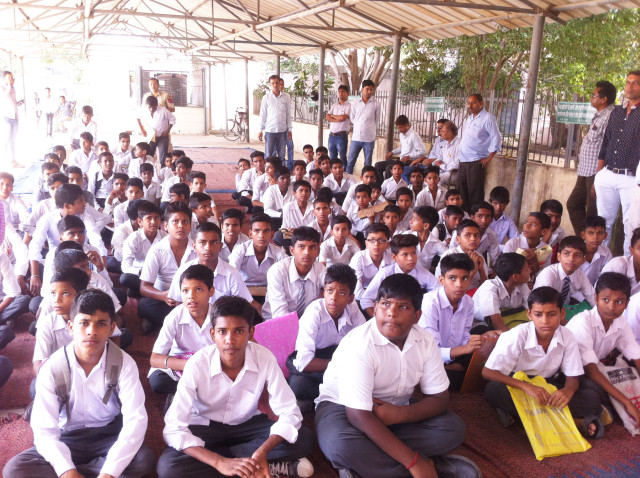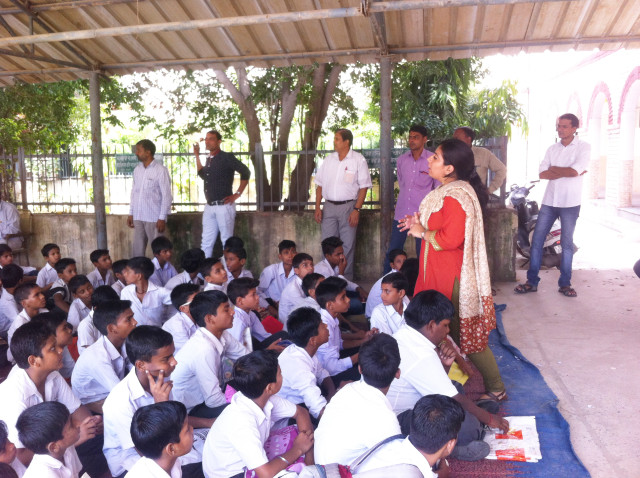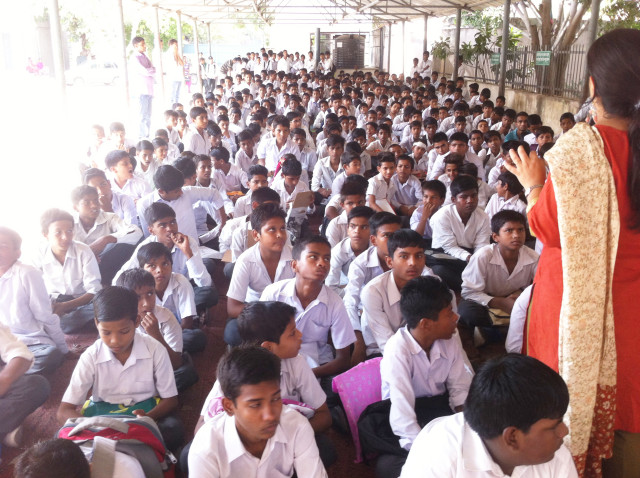Centre for Social Research along with Nanak Pura Police Station conducted a Gender Sensitization Training with students of Government Boys Senior Secondary School in Ambedkar Nagar, Delhi on 22nd September, 2015. The training had over 400 students in attendance starting from class VI to class X. The training was facilitated by Ms. Pratishtha Arora and Ms. Yashi Srivastava from CSR. The Delhi Police staff also supported during the training.
The first session was a brief introduction of the trainers and the organization, Centre for Social Research. This was followed by an introductory note on the purpose of the training and explanation of the term ‘Sensitization’. Sensitization is the effort to change attitudes, behaviors and responses towards a particular issue of concern. The motive of the training was to create awareness among the young children about basic issues of gender equality and mutual respect.


Next, there was a discussion about the gender-sex binary. The students confused the two as the same, and their response to the question what is gender was father, mother etc.
Ms. Pratishtha then explained that gender is an ascribed identity which means it is a social, political, cultural and economic entity and is burdened on individuals, whereas sex is based on natural difference of biological traits. Gender is a social categorization that not only moulds the behavior of the individuals but perpetuates a certain unequal dynamic in the society.
The participants were then asked their names, most of them were named Balwan, Trishul which basically signifies strength and power and on the other hand the women are named Komal, Naazuk which designates a secondary dependent role of the women.


Following session dealt with the stereotyping of people in society which can be both at an institutional level and an individual level. The differential treatment of a woman begins right from her birth, that is as a child she is made to play house and given dolls, whereas the men are given guns, cars basically all the toys that highlight their masculine traits. This difference in upbringing not only hurts the women but also has severe affects on the men as they have to live up to certain notion of being male. The maleness then is not something inherent but rather a performance. The difference in the representation of men and women in media was also discussed. Men are shown as driving bikes that are more powerful vehicles while women ride scooties that are lighter vehicles.


Even in school there is a clear difference in the duties and the games allocated to the girls and the boys. The boys play the games that require more strength. The participants further spoke about how the girls are not allowed to venture out in the dark. The participants who themselves were brothers had at times restricted their sisters from going out in the late hours. This led to a discussion on “patriarchy”. Patriarchy is entrenched in the Indian culture. Patriarchy is a hierarchical structure where the men hold positions of power and hold power over women and children. The participants also identified that either their father or grandfather were the head of the family.
The last session dealt with the concept of power. Power is always understood as power over instead of power with. Power of one is always when the other is subjected. The aim of this session was to make the participants aware of their duty towards the women which is to see them as equal beings with decision making power and not as people who should be teased and humiliated.
The training ended with a feedback where the students talked about how they want to make a change in their surroundings.
Donation for Centre for Social Research to Join our effort in rehabilitating Domestic Violence
Discuss this article on Facebook




